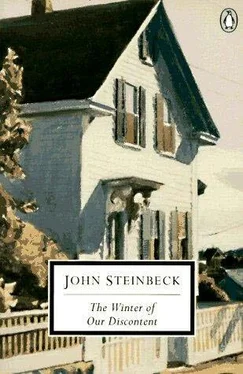John Steinbeck - The Winter of Our Discontent
Здесь есть возможность читать онлайн «John Steinbeck - The Winter of Our Discontent» весь текст электронной книги совершенно бесплатно (целиком полную версию без сокращений). В некоторых случаях можно слушать аудио, скачать через торрент в формате fb2 и присутствует краткое содержание. Жанр: Классическая проза, на английском языке. Описание произведения, (предисловие) а так же отзывы посетителей доступны на портале библиотеки ЛибКат.
- Название:The Winter of Our Discontent
- Автор:
- Жанр:
- Год:неизвестен
- ISBN:нет данных
- Рейтинг книги:5 / 5. Голосов: 1
-
Избранное:Добавить в избранное
- Отзывы:
-
Ваша оценка:
- 100
- 1
- 2
- 3
- 4
- 5
The Winter of Our Discontent: краткое содержание, описание и аннотация
Предлагаем к чтению аннотацию, описание, краткое содержание или предисловие (зависит от того, что написал сам автор книги «The Winter of Our Discontent»). Если вы не нашли необходимую информацию о книге — напишите в комментариях, мы постараемся отыскать её.
The Winter of Our Discontent — читать онлайн бесплатно полную книгу (весь текст) целиком
Ниже представлен текст книги, разбитый по страницам. Система сохранения места последней прочитанной страницы, позволяет с удобством читать онлайн бесплатно книгу «The Winter of Our Discontent», без необходимости каждый раз заново искать на чём Вы остановились. Поставьте закладку, и сможете в любой момент перейти на страницу, на которой закончили чтение.
Интервал:
Закладка:
All that came from starting to say New Baytown is a pretty town. I turned right on Elm Street instead of left and walked fast up to Porlock, which is a cockeyed parallel with High. Wee Willie, our fat constable, would be dozing in his police car on the High, and I didn’t want to pass the time of night with him. “What you doing up so late, Eth? Got yourself a little piece of something?” Wee Willie gets lonesome and loves to talk, and then later he talks about what he talked about. Quite a few small but nasty scandals have grown out of Willie’s loneliness. The day constable is Stonewall Jackson Smith. That’s not a nickname. He was christened Stonewall Jackson, and it does set him apart from all the other Smiths. I don’t know why town cops have to be opposites but they usually are. Stoney Smith is a man who wouldn’t give away what day it is unless he were on the stand under oath. Chief Smith runs the police work of the town and he’s dedicated, studies the latest methods, and has taken the F.B.I. training in Washington. I guess he’s as good a policeman as you are likely to find, tall and quiet and with eyes like little gleams of metal. If you were going in for crime, the chief would be a man to avoid.
All this came from my going over to Porlock Street to avoid talking to Wee Willie. It’s on Porlock that the beautiful houses of New Baytown are. You see in the early eighteen hundreds we had over a hundred whaling bottoms. When the ships came back from a year or two out as far as the Antarctic or the China Sea, they would be loaded with oil and very rich. But they would have touched at foreign ports and picked up things as well as ideas. That’s why you see so many Chinese things in the houses on Porlock Street. Some of those old captain-owners had good taste too. With all their money, they brought in English architects to build their houses. That’s why you see so much Adam influence and Greek revival [14] Adam influence and Greek revival: Robert Adam (1728-92) was a renowned neoclassical Scottish architect and interior designer. Greek Revival is a late neoclassical movement in architecture, inspired by Greek design.
architecture on Porlock Street. It was that period in England. But with all the fanlights and fluted columns and Greek keys, they never neglected to put a widow’s walk on the roof. The idea was that the faithful home-bound wives could go up there to watch for returning ships, and maybe some of them did. My family, the Hawleys, and the Phillipses and the Elgars and the Bakers were older. They stayed put on Elm Street and their houses were what is called Early American, peak roofs and shiplap siding. That’s the way my house, the old Hawley house, is. And the giant elms are as old as the houses.
Porlock Street has kept its gas street lamps, only there are electric globes in them now. In the summer tourists come to see the architecture and what they call “the old-world charm” of our town. Why does charm have to be old-world?
I forget how the Vermont Allens got mixed up with the Hawleys. It happened pretty soon after the Revolution. I could find out, of course. Up in the attic somewhere there will be a record. By the time father died, my Mary was pretty tired of Hawley family history, so when she suggested that we store all the things in the attic, I understood how she felt. You can get pretty tired of other people’s family history. Mary isn’t even New Baytown born. She came from a family of Irish extraction but not Catholic. She always makes a point of that. Ulster family, she calls them. She came from Boston.
No she didn’t, either. I got her in Boston. I can see both of us, maybe more clearly now than then, a nervous, frightened Second Lieutenant Hawley with a weekend pass, and the soft, petal-cheeked, sweet-smelling darling of a girl, and triply all of those because of war and textbooks. How serious we were, how deadly serious. I was going to be killed and she was prepared to devote her life to my heroic memory. It was one of a million identical dreams of a million olive uniforms and cotton prints. And it might well have ended with the traditional Dear John letter except that she devoted her life to her warrior. Her letters, sweet with steadfastness, followed me everywhere, round, clear handwriting in dark blue ink on light blue paper, so that my whole company recognized her letters and every man was curiously glad for me. Even if I hadn’t wanted to marry Mary, her constancy would have forced me to for the perpetuation of the world dream of fair and faithful women.
She has not wavered, not in the transplanting from Boston Irish tenancy to the old Hawley house on Elm Street. And she never wavered in the slow despondency of my failing business, in the birth of our children, or in the paralysis of my long clerkship. She is a waiter—I can see that now. And I guess she had at lengthy last grown weary of waiting. Never before had the iron of her wishes showed through, for my Mary is no mocker and contempt is not her tool. She has been too busy making the best of too many situations. It only seemed remarkable that the poison came to a head because it had not before. How quickly the pictures formed against the sound of frost-crunching footsteps on the night street.
There’s no reason to feel furtive walking in the early morning in New Baytown. Wee Willie makes little jokes about it but most people seeing me walking toward the bay at three in the morning would suppose I was going fishing and not give it another thought. Our people have all sorts of fishing theories, some of them secret like family recipes, and such things are respected and respectable.
The street lights made the hard white frost on the lawns and sidewalks glint like millions of tiny diamonds. Such a frost takes a footprint and there were none ahead. I have always from the time I was a child felt a curious excitement walking in new unmarked snow or frost. It is like being first in a new world, a deep, satisfying sense of discovery of something clean and new, unused, undirtied. The usual nightfolk, the cats, don’t like to walk on frost. I remember once, on a dare, I stepped out barefoot on a frosty path and it felt like a burn to my feet. But now in galoshes and thick socks I put the first scars on the glittering newness.
Where Porlock crosses Torquay, that’s where the bicycle factory is, just off Hicks Street, the clean frost was scarred with long foot-dragged tracks. Danny Taylor, a restless, unsteady ghost, wanting to be somewhere else and dragging there and wanting to be somewhere else. Danny, the town drunk. Every town has one, I guess. Danny Taylor—so many town heads shook slowly from side to side—good family, old family, last of the line, good education. Didn’t he have some trouble at the Academy? Why doesn’t he straighten up? He’s killing himself with booze and that’s wrong because Danny’s a gentleman. It’s a shame, begging money for booze. It’s a comfort that his parents aren’t alive to see it. It would kill them—but they’re dead already. But that’s New Baytown talking.
In me Danny is a raw sorrow and out of that a guilt. I should be able to help him. I’ve tried, but he won’t let me. Danny is as near to a brother as I ever had, same age and growing up, same weight and strength. Maybe my guilt comes because I am my brother’s keeper and I have not saved him. With a feeling that deep down, excuses—even valid ones—give no relief. Taylors—as old a family as Hawleys or Bakers or any of the others. In childhood I can remember no picnic, no circus, no competition, no Christmas without Danny beside me as close as my own right arm. Maybe if we had gone to college together this wouldn’t have happened. I went to Harvard—luxuriated in languages, bathed in the humanities, lodged in the old, the beautiful, the obscure, indulged myself with knowledge utterly useless in running a grocery store, as it developed. And always I wished Danny could be with me on that bright and excited pilgrimage. But Danny was bred for the sea. His appointment to the Naval Academy was planned and verified and certain even when we were kids. His father sewed up the appointment every time we got a new Congressman.
Читать дальшеИнтервал:
Закладка:
Похожие книги на «The Winter of Our Discontent»
Представляем Вашему вниманию похожие книги на «The Winter of Our Discontent» списком для выбора. Мы отобрали схожую по названию и смыслу литературу в надежде предоставить читателям больше вариантов отыскать новые, интересные, ещё непрочитанные произведения.
Обсуждение, отзывы о книге «The Winter of Our Discontent» и просто собственные мнения читателей. Оставьте ваши комментарии, напишите, что Вы думаете о произведении, его смысле или главных героях. Укажите что конкретно понравилось, а что нет, и почему Вы так считаете.











